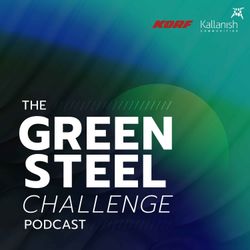Latest episode
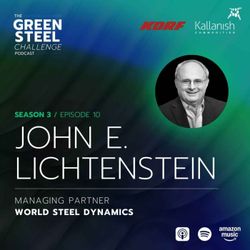
Season 3/Episode 10: John E. Lichtenstein, World Steel Dynamics
38:32|Partner at World Steel Dynamics. World Steel Dynamics is a leading strategic information service that tracks, models, and forecasts steel industry trends — from pricing and trade to decarbonization and technology disruption. John joined us two years ago in Season 1 of the Green Steel Challenge, offering one of the most thoughtful takes on the structural changes shaping the steel industry.This time John would like to focus on scrap. Scrap is no longer a by-product — it’s the backbone of green steel. In this conversation, we’ll dive into where the scrap market is headed, who will win or lose in the global reshuffling, and what role policy, quality, and innovation will play in unlocking its full potential.
More episodes
View all episodes
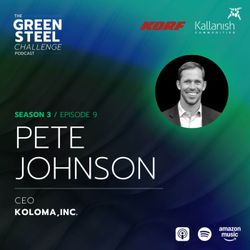
Season 3/Episode 9: Pete Johnson, Koloma,Inc.
48:10|Pete Johnson, CEO and co-founder of Koloma, based in Denver, Colorado. Koloma is focused on exploring and developing geologic (or “natural”) hydrogen as a new low-carbon energy source.If Koloma succeeds, it could transform the economics and availability of hydrogen – this could be a game-changer for decarbonising heavy industry. We’ll discover what geologic hydrogen is, how it’s found, and what it could mean for the future of green steel. Pete is offering us a fascinating glimpse into the future of clean hydrogen and its potential to transform the way we think about energy and industrial decarbonisation.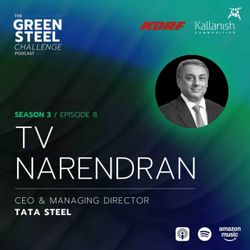
Season 3/ Episode 8: TV Narendran, Tata Steel
47:33|T. V. Narendran, CEO and Managing Director of Tata Steel, based in Mumbai in India. Tata is one of the world’s most respected steel companies.We’ll discuss how Tata Steel is reimagining steelmaking through innovation, electrification, and new technologies.His perspective reminds us that the road to green steel is not just about new technology—it’s about rethinking systems, partnerships, and the economics of sustainability.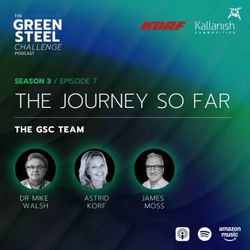
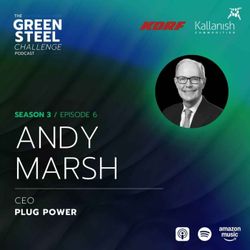
Season 3/Episode 6: Andy Marsh, Plug Power
39:53|Andy Marsh has served as CEO of Plug since April 2008, guiding the company’s transformation into a global leader in the hydrogen economy. Under his leadership, Plug has built the industry’s first vertically integrated green hydrogen ecosystem—spanning production, storage, delivery, and power generation—to help customers decarbonize at scale and achieve energy independence. A forward-thinking executive with deep technical expertise and a strong commercial focus, Marsh has led Plug’s strategic evolution from a fuel cell pioneer to a full-spectrum hydrogen solutions provider. His vision and leadership have positioned Plug at the forefront of the global energy transition, delivering breakthrough technologies and building long-term partnerships with industry leaders like Amazon, Walmart, and Home Depot. Prior to Plug, Marsh was co-founder and CEO of Valere Power, a power solutions company serving the telecommunications industry. Under his leadership, Valere grew into a profitable global operation with more than 200 employees and $90 million in revenue, ultimately leading to its acquisition by Eltek ASA in 2007. During his tenure, Valere earned numerous accolades, including the Tech Titan Award and Red Herring’s Top 100 Innovators. Marsh is a recognized thought leader in the hydrogen and clean energy sectors. He is the former Chair of the Fuel Cell and Hydrogen Energy Association (FCHEA), a member of the Hydrogen Council, and serves on several boards, including GEVO, the UAlbany Economic Advisory Board, and the Northern Ireland Delegation.He holds a Master’s in Electrical Engineering from Duke University, an MBA from Southern Methodist University, and a Bachelor’s degree in Engineering from Temple University.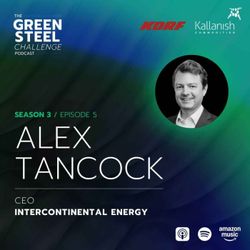
Season 3/Episode 5: Alex Tancock, Intercontinental Energy
37:22|Alex Tancock is the CEO of InterContinental Energy, a global leader in large-scalegreen hydrogen development who has been at the forefront of the industry for morethan 10 years. Under his leadership, the company has pioneered a portfolio ofgroundbreaking projects, with its three flagship projects attracting partnerships fromsome of the largest names in energy.With backing from major institutional investors like GIC and Hy24, InterContinentalEnergy has established itself at the forefront of the green molecule sector. Thecompany’s innovative team and approach extends beyond project development, andinto giga scale enabling technology through its patented P2(H2)Node TM architecture.Alex's expertise and strategic insights make him a significant voice in the energy.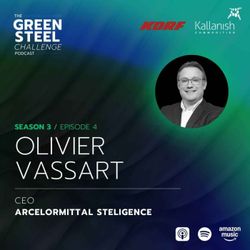
Season 3/Episode 4: Olivier Vassart, ArcelorMittal Steligence
42:36|Steligence is ArcelorMittal’s science-backed construction philosophy that treats buildings as holistic, “living” entities—promoting integrated collaboration between architects, engineers, and developers to optimize flexibility, cost, and sustainability. It leverages a tailored suite of steel products and modular design to deliver measurable benefits like faster construction, lighter foundations, and reduced embodied carbon. Ultimately, Steligence accelerates demand for green steel by providing concrete design frameworks that enhance economic and environmental performance in buildings.
